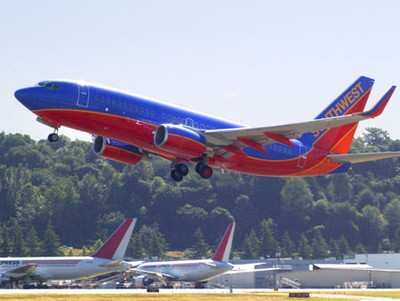You Are Now Free To Snap Up Your Competitors?
In a recent question-and-answer session with the Dallas Morning
News, Southwest Airlines CEO Gary Kelly said the trendsetting
low-cost carrier is interested in consolidation... but he made it
quite clear it will be Southwest writing the big check if and when
that happens.

"At some point, I think we'll probably acquire somebody," Kelly
(above) said. "There's bound to be a scenario that we would
say, 'That scenario out of these 10, yep, that one would work for
us.' We'd want to be prepared for that opportunity that presents
itself."
Kelly pointed to Southwest's 2004 investment in then-bankrupt
ATA Airlines as an example of the airline's interest in snatching
up weaker competitors. Southwest also acquired Muse Air in 1986,
and Morris Air in 1993 -- deals that showed Southwest both
advantages and pitfalls of taking over another airline.
 In the short term, Kelly said,
Southwest is interested in doing the best it can, in an industry
whose current state he classified as "very tenuous," and not
prepared for a looming slowdown in the US economy.
In the short term, Kelly said,
Southwest is interested in doing the best it can, in an industry
whose current state he classified as "very tenuous," and not
prepared for a looming slowdown in the US economy.
"I think the business cycle this decade has been very difficult
for our industry. You know, finally in 2006 and 2007, you were
seeing some profit reports by various airlines," Kelly said. "Two
emerged from bankruptcy in 2007. [But] It looks like those profits
may be short-lived.
"It'll be an interesting 2008," he added.
Kelly added Southwest is in a better position than most of its
legacy and low-cost competitors. As ANN reported, Southwest
managed to hedge 70 percent of its fuel for 2008 at about $50 per
barrel -- far below prices that earlier this year came close to
twice that. While that's not as good as the 90 percent supply
hedged for 2007, Kelly added, it still leaves Southwest in a better
position to ride out spikes in oil prices than its rivals -- as
long as prices stay high.
"The balance sheet is in great shape," Kelly said. "You know,
our leverage is well below 50 percent. We're under 40 percent total
debt -- that's including all of our aircraft leases."
Rather than focusing on acquiring another carrier -- yet --
Kelly said Southwest is working to keep the airline's unique brand
identity intact, even as it moves to increase profitability by appealing to business
travelers, over its bread-and-butter customer
base.
"I don't want to be like other airlines," Kelly said. "We want
to be Southwest. But we're a business, so we also have to be
profitable and prosperous in the way that we offer this. So I think
that is the trick .. We want to be low fares. We want to have great
personal customer service. We are not going in a direction like
some of our European counterparts who, they don't capitalize "C" in
customer, I assure you.

"But, you know, we also have to find ways to beat our
competitors and win customers," he added. "In some ways, that may
give the appearance like we're acting like other airlines, but if
you put everything we do today together as a whole, we still, I
think, are very different."
In response to a question regarding a theoretical suggestion
from a hedge fund manager, telling Southwest to acquire a
competitor like AirTran, Kelly took a swipe at recent reports of a
merger between Delta and United -- a scenario that, apparently,
existed only in the minds of officials at investor Pardus Capital
Management.
"We can't let investors guide the company. That's not to say
that investors aren't smart and don't have good ideas, because they
do. They just have different motives. We've got to stay true to who
we are as a company and build for the long term...

"At some point, I think we'll probably acquire somebody," Kelly
restated. "That's just a reflection of my view that the industry is
weak and that there'll be players up for sale, probably in a
fire-sale mode, and we'll want to at least be thoughtful about
that. We'll still have all the considerations -- the fleet, the
labor contracts, the seniority issues, the cost implications of it,
the cultural aspects of trying to bring two work groups together
and on and on and on. We would be concerned about that and always
have been."
 ANN's Daily Aero-Linx (04.30.25)
ANN's Daily Aero-Linx (04.30.25) ANN FAQ: Turn On Post Notifications
ANN FAQ: Turn On Post Notifications Classic Aero-TV: Agile Aeros Jeff Greason--Disruptive Aerospace Innovations
Classic Aero-TV: Agile Aeros Jeff Greason--Disruptive Aerospace Innovations Aero-News: Quote of the Day (04.30.25)
Aero-News: Quote of the Day (04.30.25) ANN's Daily Aero-Term (04.30.25): Expedite
ANN's Daily Aero-Term (04.30.25): Expedite






